Why is the BBC launching a voice assistant?
‘Beeb’ will focus on regional accent recognition to stand out from Amazon’s Alexa and Google Assistant

A free daily email with the biggest news stories of the day – and the best features from TheWeek.com
You are now subscribed
Your newsletter sign-up was successful
The BBC is launching its own digital voice assistant in a move that will see it go head-to-head with tech giants Amazon and Google.
The system, which has the working title “Beeb”, will take the form of voice assistance software that can be accessed through a host of smart speakers, phones and TVs, rather than a dedicated piece of hardware such as an Amazon Echo, the BBC says.
Users can wake the system by saying the word “Beeb”, followed by a command, the broadcaster says. However, the wake word is still under review and may change when the service launches next year.
The Week
Escape your echo chamber. Get the facts behind the news, plus analysis from multiple perspectives.

Sign up for The Week's Free Newsletters
From our morning news briefing to a weekly Good News Newsletter, get the best of The Week delivered directly to your inbox.
From our morning news briefing to a weekly Good News Newsletter, get the best of The Week delivered directly to your inbox.
What is Beeb and how will it work?
Simply put, it’s the BBC’s answer to the likes of Amazon’s Alexa and Google Assistant.
According to TechRadar, the service will initially be built into the broadcaster’s website and serve as a tool that lets users navigate its iPlayer catch-up service hands-free. It will also make its way on to other devices, although it’s up to hardware makers as to whether they bundle the software into their products.
It may seem odd that a broadcaster would want to rival some of the world’s biggest tech giants, but the BBC argues that the service will help it “experiment with new programmes, features and experiences without someone else’s permission to build it in a certain way”, the Mirror reports.
A free daily email with the biggest news stories of the day – and the best features from TheWeek.com
Why regional accents - and data - are key to Beeb’s success
Given that the broadcaster is going up against a multibillion-dollar industry, it’s had to think outside the box to set itself apart from the competition.
The BBC has pledged to create a system that will understand regional accents, as some US-based voice assistants are notoriously bad at detecting certain dialects, The Guardian says.
Over the next week, the BBC will ask staff in its offices across the UK to record their voices and ensure that the assistant can understand them, the newspaper says.
Plus, with about 20% of households in Britain having some form of device with voice assistant features, the broadcaster plans to collect data from Beeb users to help improve the system’s receptiveness to accents.
Kieran Clifton, head of distribution & business development at the BBC, said the system could be vital to its programming schedule, too.
“Data is more and more important – as it helps us to make more types of programmes we know people like, and equally importantly, identify gaps in our commissioning to ensure we’re making something for all audiences,” he told the Mirror.
“We also use the data collected about what you watch, listen to or read online to offer personalised programme recommendations,” Clifton added.
-
 What to know before filing your own taxes for the first time
What to know before filing your own taxes for the first timethe explainer Tackle this financial milestone with confidence
-
 The biggest box office flops of the 21st century
The biggest box office flops of the 21st centuryin depth Unnecessary remakes and turgid, expensive CGI-fests highlight this list of these most notorious box-office losers
-
 What are the best investments for beginners?
What are the best investments for beginners?The Explainer Stocks and ETFs and bonds, oh my
-
 Will AI kill the smartphone?
Will AI kill the smartphone?In The Spotlight OpenAI and Meta want to unseat the ‘Lennon and McCartney’ of the gadget era
-
 Claude Code: Anthropic’s wildly popular AI coding app
Claude Code: Anthropic’s wildly popular AI coding appThe Explainer Engineers and noncoders alike are helping the app go viral
-
 Will regulators put a stop to Grok’s deepfake porn images of real people?
Will regulators put a stop to Grok’s deepfake porn images of real people?Today’s Big Question Users command AI chatbot to undress pictures of women and children
-
 Most data centers are being built in the wrong climate
Most data centers are being built in the wrong climateThe explainer Data centers require substantial water and energy. But certain locations are more strained than others, mainly due to rising temperatures.
-
 The dark side of how kids are using AI
The dark side of how kids are using AIUnder the Radar Chatbots have become places where children ‘talk about violence, explore romantic or sexual roleplay, and seek advice when no adult is watching’
-
 Why 2025 was a pivotal year for AI
Why 2025 was a pivotal year for AITalking Point The ‘hype’ and ‘hopes’ around artificial intelligence are ‘like nothing the world has seen before’
-
 AI griefbots create a computerized afterlife
AI griefbots create a computerized afterlifeUnder the Radar Some say the machines help people mourn; others are skeptical
-
 The robot revolution
The robot revolutionFeature Advances in tech and AI are producing android machine workers. What will that mean for humans?